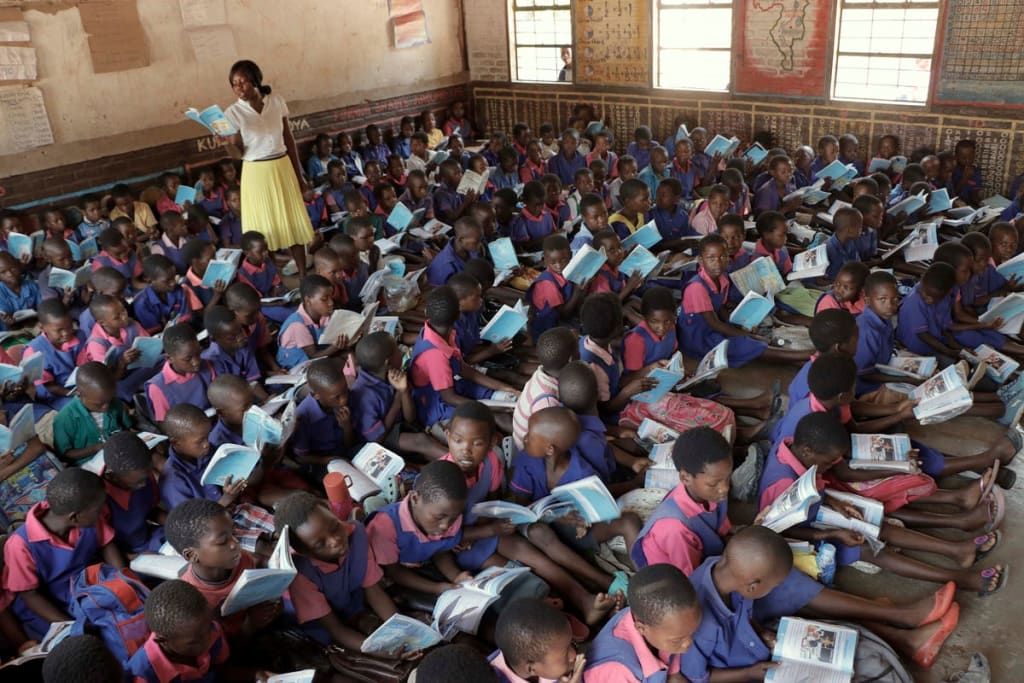Problems of Primary Schools Education In Nigeria
How the soaring population and limited resources strained the educational infrastructure

In the heart of Nigeria, where the vibrant culture and resilient spirit of its people intersect, lies the bustling city of Lagos. Within the city's labyrinth of neighborhoods, there exists a primary school named Hopeful Haven, its name a stark contrast to the challenges that beset the realm of primary education in the country.
At first glance, the school seemed like any other, with its lively courtyard echoing the laughter of children and the vivid murals on its walls telling tales of hope and dreams. Yet, beneath the surface, a complex tapestry of problems unfolded, unraveling the potential of the young minds entrusted to its care.
Hopeful Haven, like many primary schools in Nigeria, grappled with overcrowded classrooms. The soaring population and limited resources strained the educational infrastructure, leaving educators to navigate the delicate balance between fostering individual growth and managing a sea of eager faces. In a classroom meant for thirty, fifty children crammed together, their eyes hungry for knowledge but often lost in the shuffle.
Resources, or rather the lack thereof, cast a long shadow over the corridors of Hopeful Haven. Tattered textbooks with missing pages were shared among students, their worn-out covers telling tales of countless hands that had sought knowledge within their faded pages. The scarcity of educational materials stifled the potential for a robust learning experience, leaving both teachers and pupils grappling with the challenge of imparting and acquiring knowledge with meager tools.
The specter of inadequate infrastructure haunted the school, manifesting in dilapidated buildings and a scarcity of essential amenities. Classrooms, weathered by time and neglect, allowed raindrops to infiltrate during the wet season, turning the pursuit of education into a battle against the elements. Broken desks, worn-out chairs, and the absence of basic sanitation facilities further underscored the dire need for infrastructural overhaul in the realm of primary education.
Within this educational landscape, the teachers of Hopeful Haven bore the weight of numerous challenges. Underpaid and overworked, they toiled tirelessly to nurture the minds of the future generation. The lack of professional development opportunities and insufficient training left them grappling with outdated teaching methodologies, hindering their ability to adapt to the evolving needs of education in the 21st century.
One of the most pervasive challenges in Nigerian primary education was the prevalence of high dropout rates. Economic hardships forced families to prioritize immediate needs over the pursuit of education, and the allure of the streets often proved stronger than the promise of knowledge. Girls, in particular, faced additional hurdles, with cultural norms and societal expectations conspiring to limit their access to education.
The curriculum, though designed with noble intentions, often fell short of addressing the diverse needs of students. The emphasis on rote memorization and a one-size-fits-all approach left little room for cultivating critical thinking skills and creativity. The mismatch between the curriculum and the dynamic needs of the modern world threatened to produce a generation ill-equipped to navigate the complexities of an ever-evolving global landscape.
In the midst of these challenges, however, there existed a glimmer of hope. Hopeful Haven became a microcosm of resilience and determination. The teachers, despite their meager resources, implemented innovative teaching strategies. They formed partnerships with local organizations to secure additional learning materials and sought creative solutions to engage their students beyond the confines of outdated textbooks.
Community involvement emerged as a beacon of optimism. Parents, recognizing the transformative power of education, rallied to support the school. Volunteer initiatives sprouted, aiming to bridge the resource gap and provide much-needed mentorship to students. The synergy between the school and the community began to redefine the narrative, demonstrating that collective action could surmount even the most formidable challenges.
In the face of adversity, Hopeful Haven became a symbol of the undying spirit of Nigerian primary education. The problems were daunting, the road ahead uncertain, but within the echoing halls of the school, a resilient chorus of hope persisted. As the sun dipped below the horizon, casting a warm glow over Lagos, the children of Hopeful Haven continued to dream, their aspirations reaching beyond the limitations imposed by circumstance, their potential awaiting the transformative touch of a reimagined education system.
About the Creator
Enjoyed the story? Support the Creator.
Subscribe for free to receive all their stories in your feed. You could also pledge your support or give them a one-off tip, letting them know you appreciate their work.





Comments (1)
This article is fantastic